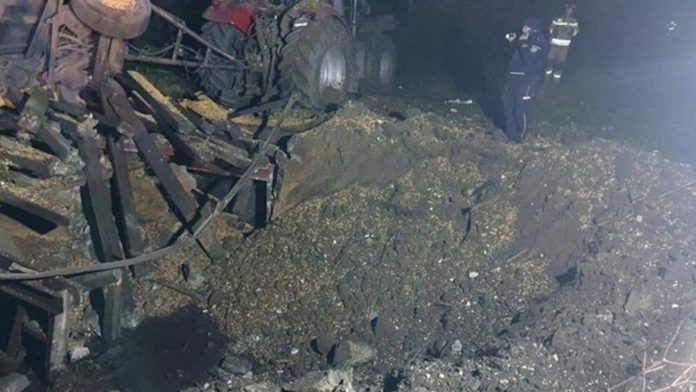It is being speculated for the past 24 hours in a section of the media that a Nato attack on Russia is imminent — since the time Poland alleged that a Russian missile had landed in its territory, killing two Polish citizens. And, the speculators say, since Russia is no pushover, retaliation will follow, which would escalate to the ‘Third World War’!
Poland said early Wednesday that a Russian-made missile fell in the country’s east, killing two people. The blast, which Ukrainian President Volodymyr Zelenskyy decried as “a very significant escalation,” prompted Biden to call an emergency meeting of G-7 and Nato leaders. A deliberate, hostile attack on Nato member Poland could trigger a collective military response by the alliance.
The official handle of the Polish president tweeted a message that reads (translated): “President @AndrzejDuda: I informed @jensstoltenberg, @POTUS, @RishiSunak and @OlafScholz that our ambassador will participate in the North Atlantic Council and that it is highly probable that he will request the activation of Article 4, i.e. allied consultations.”
Jens Stoltenberg is the secretary-general of Nato, “POTUS” refers to President Joe Biden and Rishi Sunak and Olaf Scholz are the prime ministers of the UK and Chancellor of Germany, the two most important members of Nato in Europe, respectively.
Meanwhile, the speculators cited clauses in the Nato agreement that essentially say that an attack on a member state amounts to an attack on all member states, which would merit a collective reactionary response.
In 1949, the primary aim of the North Atlantic Treaty, Nato’s founding agreement, was to create a pact of mutual assistance to counter the risk that the Soviet Union would seek to extend its control of Eastern Europe to other parts of the continent. Every participating country agreed that this form of solidarity was at the heart of the Treaty, effectively making Article 5 on collective defence a key component of the Alliance.
Article 5 hence provided that if a NATO ally were to be the victim of an armed attack, every other member of the alliance would consider the act of violence as an armed attack against all members and would take the actions it deemed necessary to assist the ally attacked.
Article 5 of Nato
“The Parties agree that an armed attack against one or more of them in Europe or North America shall be considered an attack against them all and consequently they agree that, if such an armed attack occurs, each of them, in (an) exercise of the right of individual or collective self-defence recognized by Article 51 of the Charter of the United Nations, will assist the Party or Parties so attacked by taking forthwith, individually and in concert with the other Parties, such action as it deems necessary, including the use of armed force, to restore and maintain the security of the North Atlantic area.
Any such armed attack and all measures taken as a result thereof shall immediately be reported to the Security Council. Such measures shall be terminated when the Security Council has taken the measures necessary to restore and maintain international peace and security.”
This article is complemented by Article 6, which stipulates:
Article 6 of Nato
“For the purpose of Article 5, an armed attack on one or more of the Parties is deemed to include an armed attack:
on the territory of any of the Parties in Europe or North America, on the Algerian Departments of France 2, on the territory of Turkey or on the Islands under the jurisdiction of any of the Parties in the North Atlantic area north of the Tropic of Cancer;
on the forces, vessels, or aircraft of any of the Parties, when in or over these territories or any other area in Europe in which occupation forces of any of the Parties were stationed on the date when the Treaty entered into force or the Mediterranean Sea or the North Atlantic area north of the Tropic of Cancer.”
Why the missile will not lead to another World War
Following the Polish allegation, however, while US President Joe Biden had said yesterday that it was a serious development, he said today that the missile might not have been Russian. There are also reports that the missile might have been Ukrainian, much as Zelenskyy had pounced on the opportunity thrown up by the Polish claim to condemn Russia.
Initial findings suggest they were Ukrainian forces that had fired the missile that hit Poland while trying to intercept an incoming Russian missile. President Biden said a rocket that struck a village in Poland near the Ukraine border was unlikely a Russian missile, a comment that may limit the risk of a major escalation in tensions over the incident.
Did you know the US government can’t afford to spend on Ukraine anymore?
Asked whether it was too early to say that any missile was fired from Russia, Biden said that the trajectory suggested otherwise. “There is preliminary information that contests that,” he told reporters. “I don’t want to say that until we completely investigate it but it is unlikely that it was fired from Russia, but we’ll see.” The US and Nato countries would fully investigate before acting, he added.
The statement raised several questions, including whether Biden meant Russia likely had no culpability in the missile firing incident at all. The White House did not immediately clarify. But with the US, the leading member country of Nato, making light of the situation, the landing of this missile in Polish territory is unlikely to escalate to a World War.
How is Poland’s hurried allegation against Russia justified?
Since the era of Joseph Stalin in the Union of Soviet Socialist Republics, Russia-Poland relations showered. The initial antagonism was caused by Stalin’s crackdown on Church-goers, which did not go down well with the devout Christians of Poland.
What was worse, during the final stages of the Second World War, as the Red Army of the Soviet Union marched into Poland, purportedly to recover it from Adolf Hitler’s Nazi occupation, the Russian soldiers raped thousands of Polish women on the way.
Lastly, there was a failed assassination attempt on Pope John Paul II, the cleric from Poland who went on to occupy the highest seat of authority in the Catholic Christian world, on 13 May 1981. Several intelligence agencies in Europe believed that the bid on the then pope’s life was made by the Soviet Union, although this remained a disputed claim.
Poland was, however, a part of the Warsaw Pact during the Cold War years, wherein the USSR tried to deter Nato with its own military alliance comprising largely East Germany and several eastern European countries. Five years after the collapse of the communist citadel, Poland joined Nato.
Through the changing times since Stalin though, it does not appear the Poles have forgiven the Russians.
Curiously, Poland itself is not sure of the missile’s origin. President Andrzej Duda first told reporters it was “most probably” Russian-made and that its origins were still being verified. He later said there was no concrete evidence of who fired it, and the incident was a one-off. “We are acting with calm. This is a difficult situation,” Duda told reporters. He said Poland was raising its level of military preparedness.
Russia has denied it fired the missile. Its defence ministry called the reports that said otherwise “a deliberate provocation aimed at escalating the situation”. Kremlin spokesperson Dmitry Peskov, meanwhile, said he had no information on an explosion in Poland.




You must log in to post a comment.